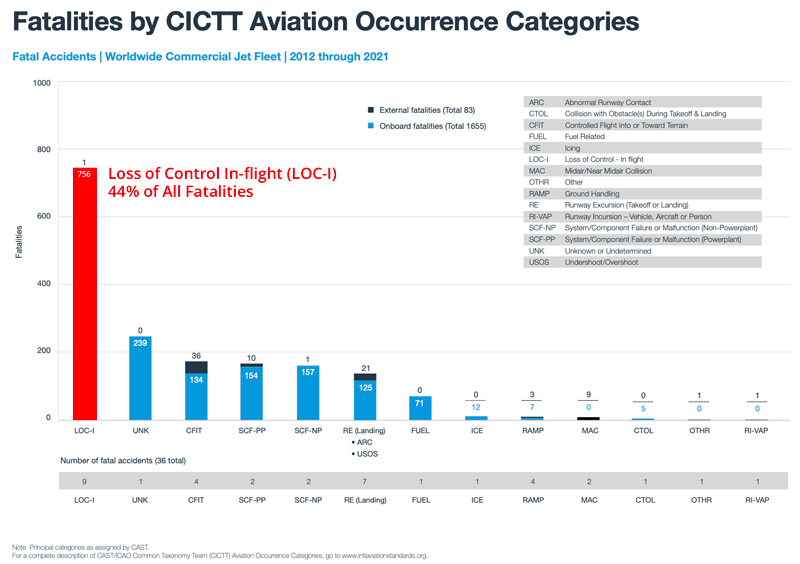Consistently, over the past 60 years of statistically analyzed accident history in commercial aviation, Loss of Control In-Flight (LOC-I) is indisputably one of the leading causes of airplane crashes and crash-related fatalities worldwide. LOC-I is defined as an extreme manifestation of a deviation from the intended flight path. Formerly rivaled only by Controlled Flight Into Terrain (CFIT) in magnitude and persistence, LOC-I presents a unique challenge to professional aviation as it highlights a serious deficiency in the pilot’s ability to deal with a variety of unusual flight attitudes and flight envelope excursions. Regrettably, current pilot training curricula, standards and certification requirements perpetuate this pilot-skill deficiency.
In a report issued by Boeing in August 2022, LOC-I represents the most severe cause factor in commercial aviation over the past 10 years, resulting in the most crash-related fatalities from 2012 through 2021 – over fives times more than CFIT. According to the Commercial Aviation Safety Team (CAST), number of fatalities associated by category is the most accurate representation of the severity of an accident as opposed to hull-losses that has historically been used as an indicator of crash severity. Aviation safety organizations and legislating agencies continue to accurately identify the lethality and severity of LOC-I.
Unfortunately, without any demonstrated ability to implement an effective solution commercial aviation will continue to be plagued by high rates of LOC-I fatalities until a solution is found. Where CFIT can be economically and effectively addressed through the integration of improved ground proximity warning systems and enhanced vision instrumentation augmentation, technology does not offer a “quick fix” to LOC-I. Short of re-equipping commercial aircraft around the world with substantially improved Fly-By-Wire flight control systems with all-attitude all-envelope flight control laws, an industry-wide technological solution to LOC-I is unlikely in the foreseeable future.
Fortunately, the Upset Recovery & Prevention Training Association (UPRTA) is on the leading edge of worldwide industry solutions to loss of control in-flight to give the industry access to proven training programs and resources to improve safety of flight.


Pingback: FAA to Seek Major Changes in Pilot Training | Upset Prevention & Recovery Training Association
Pingback: A importância do treinamento de atitudes anormais na formação de pilotos | aeromagia